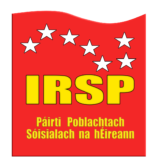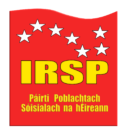An article by Belfast IRSP activist Seán Nuinseann regarding the heroin epidemic gripping our communities in Belfast.
This evening, the BBC reported on the dramatic increase in Heroin use across Belfast, with the claims substantiated by users, volunteers attempting to care for addicts and an elected councillor. Heroin and it’s assault on the streets of Belfast has long been a story on the lips of working class communities across the city, but rarely is the topic highlighted aside from the odd newsflash such as that broadcasted this evening.
Firstly, we must recognise the users of heroin as victims. There is a task at hand to convince communities that this is the appropriate perspective as many, due to the fear of the drug, view addicts as dangerous animals, as opposed to acknowledging the reality that addicts are human beings with their own story to tell. If working class communities continue to ignore or dismiss the elephant in room, the drug heroin and those that profit from its distribution will thrive.
For years now, heroin users and concerned families of heroin users have swam to the point of exhaustion as they fought for medical help and the opportunity to engage with rehab-type facilities. Reports that being granted the opportunity to participate in medically approved rehabilitation programmes is a struggle in itself were backed tonight by a man lying on the streets of this city crying out for a lifeline. This individual waited over two years for essential help to combat his addiction and eventually returned to heroin as the demon, in the absence of professional assistance, overpowered him.
From Townsend Street to the Lisburn Road and within working class communities such as Divis, the Whiterock, the length and breath of the Falls Road and across the city, no lonely corner escapes the grasp of the needle. Many prefer not to discuss the subject as if refusing to see it makes it non-existent. Heroin has now gripped Belfast and there’s no sign of it letting go, particularly as resources required by services that specialise in the treatment of addicts and the education of young people vulnerable to the appeal of drugs are not made available by the powers that be.
Where are those that claim to speak for these areas? This is not an attack on elected representatives, but the councillor on BBC News tonight breaks the mould as he is the first I’ve witnessed standing before the cameras calling this for what it is, an “epidemic”. What resources are available to families in need of help? I am unaware of any drugs outreach workers or accessible rehabilitation facilities located near the working class areas of Belfast enduring the aggression of extreme drugs. The government appears to prioritise funding arrest operations against lowly cannabis peddlers over offering treatment to addicts edging closer to death by the hour.
We all share a responsibility to keep an eye on our children, our siblings, our friends and our neighbours. “Belfast is becoming Dublin” is a quote thrown out there time and time again, referring to the devastating effects Heroin has had on Ireland’s capital city, but a wise prediction it was. No hope lies in closing the curtains on this battle. Residents, community workers, political activists and concerned families must bang their heads together now because the pile under the carpet has now become the devil on the doorstep.

